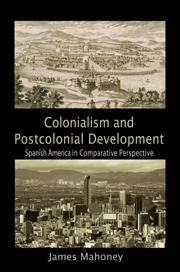Book contents
- Frontmatter
- Contents
- List of Tables, Figures, and Maps
- Preface
- 1 Explaining Levels of Colonialism and Postcolonial Development
- 2 Spain and Its Colonial Empire in the Americas
- 3 Mercantilist Colonialism
- 4 Liberal Colonialism
- 5 Warfare and Postcolonial Development
- 6 Postcolonial Levels of Development
- 7 British and Portuguese Colonialism
- 8 Conclusion
- Notes
- Glossary
- Select Bibliography of Works on Colonial Spanish America
- Index
- Titles in the Series
5 - Warfare and Postcolonial Development
Published online by Cambridge University Press: 05 June 2012
- Frontmatter
- Contents
- List of Tables, Figures, and Maps
- Preface
- 1 Explaining Levels of Colonialism and Postcolonial Development
- 2 Spain and Its Colonial Empire in the Americas
- 3 Mercantilist Colonialism
- 4 Liberal Colonialism
- 5 Warfare and Postcolonial Development
- 6 Postcolonial Levels of Development
- 7 British and Portuguese Colonialism
- 8 Conclusion
- Notes
- Glossary
- Select Bibliography of Works on Colonial Spanish America
- Index
- Titles in the Series
Summary
Independence was a powerful yet finite force, which tore through Spanish America like a great storm, sweeping away the lines of attachment to Spain and the fabric of colonial government, but leaving intact the deeply rooted bases of colonial society.
– John LynchWar did have some of the expected results in Latin America. As in Europe, it often led to the destruction of the losing side…Among winners…[war] provided the expected economic stimulus.
– Miguel Angel CentenoColonial history was not destiny for the six territories that were peripheries under both the Habsburg and Bourbon monarchies. Chile, Costa Rica, El Salvador, Honduras, Nicaragua, and Paraguay emerged from colonialism as extremely poor new nations. This initial backwardness was, to be sure, a direct outgrowth of their colonial experience as sustained peripheries. Yet colonial institutions and actors were so weakly implanted in these countries that it remained possible for them to improve their situation in the decades immediately following independence. Less strongly imprinted than the colonial centers and semiperipheries, the sustained peripheries were capable of reinventing themselves.
Successful reinvention of economies and societies in the immediate aftermath of colonialism was hardly guaranteed, however. Of the six sustained peripheries, only two managed to rise from the bottom of the region's economic hierarchy. It was specifically Chile and Costa Rica where postcolonial actors established competitive economies and sustained real growth via primary exports during the decades that followed independence.
Information
- Type
- Chapter
- Information
- Colonialism and Postcolonial DevelopmentSpanish America in Comparative Perspective, pp. 189 - 202Publisher: Cambridge University PressPrint publication year: 2010
